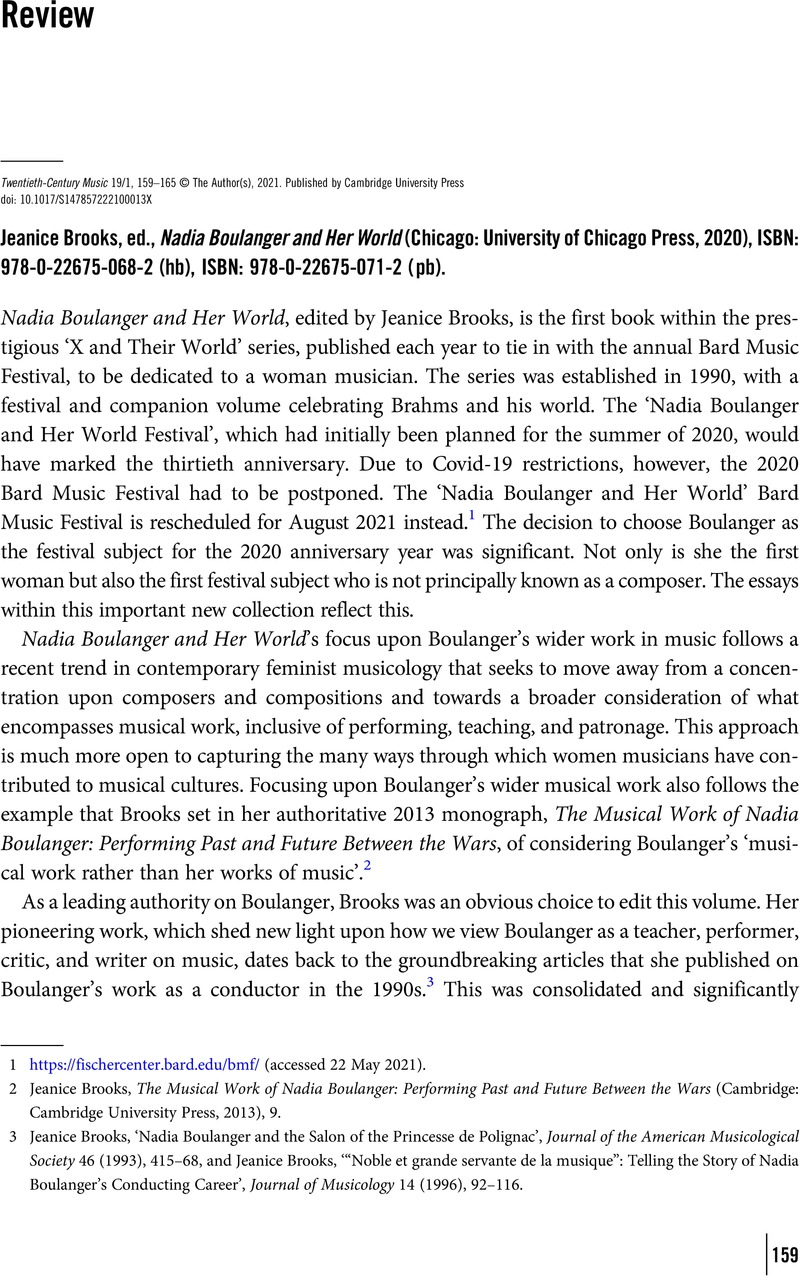No CrossRef data available.
Article contents
Jeanice Brooks, ed., Nadia Boulanger and Her World (Chicago: University of Chicago Press, 2020), ISBN: 978-0-22675-068-2 (hb), ISBN: 978-0-22675-071-2 (pb).
Published online by Cambridge University Press: 21 July 2021
Abstract

- Type
- Review
- Information
- Copyright
- Copyright © The Author(s), 2021. Published by Cambridge University Press
References
1 https://fischercenter.bard.edu/bmf/ (accessed 22 May 2021).
2 Brooks, Jeanice, The Musical Work of Nadia Boulanger: Performing Past and Future Between the Wars (Cambridge: Cambridge University Press, 2013), 9CrossRefGoogle Scholar.
3 Brooks, Jeanice, ‘Nadia Boulanger and the Salon of the Princesse de Polignac’, Journal of the American Musicological Society 46 (1993), 415–68CrossRefGoogle Scholar, and Brooks, Jeanice, ‘“Noble et grande servante de la musique”: Telling the Story of Nadia Boulanger's Conducting Career’, Journal of Musicology 14 (1996), 92–116CrossRefGoogle Scholar.
4 Jeanice Brooks and Kimberly Francis, eds., Nadia Boulanger: Thoughts on Music (Rochester, NY: University of Rochester Press, 2020).
5 Although she failed to win first prize in the Prix de Rome competition, she did win the Deuxième Second Grand Prix de Rome (essentially the third prize) in 1908. See Fauser, Annegret, ‘La Guerre en dentelles: Women and the Prix de Rome in French Cultural Politics’, Journal of the American Musicological Society 51 (1998), 83–129CrossRefGoogle Scholar.
6 This was originally published (in Polish translation) in the Polish art journal Przegląd Kulturalny (The Cultural Review).
7 Given Boulanger's well-known (and mutual) hostility towards Messiaen, her interest in Boulez is all the more surprising.
8 For a detailed study of the many women composers active in nineteenth-century France, see Florence Launay, Les Compositrices en France au XIXe siècle (Paris: Fayard, 2006). For a study of women musicians in interwar France, see Laura Hamer, Female Composers, Conductors, Performers: Musiciennes of Interwar France, 1919–1939 (London and New York: Routledge, 2018).
9 Hamer, Musiciennes of Interwar France, 1919–1939, 162–8.
10 Branger, Jean-Christophe, ‘Être cheffe d'orchestre à Paris dans l'entre-deux guerres: les concerts symphoniques dirigés par Eva Brunelli, Carmen Studer-Weingartner et Gertrud Herliczka’, Revue de musicologie 102/2 (2016), 319–61Google Scholar.
11 Hamer, Laura, ‘On the Conductor's Podium: Jane Evrard and the Orchestre féminin de Paris’, The Musical Times 152/1916 (Autumn 2011), 81–100Google Scholar, and Hamer, Musiciennes of Interwar France, 1919–1939, 168–73.
12 Laura Hamer, ‘The Gender Paradox: Criticism of Women and Women as Critics’, in The Cambridge History of Music Criticism, ed. Christopher Dingle (Cambridge: Cambridge University Press, 2019), 286.
13 See, in particular, Rosenstiel, Léonie, Nadia Boulanger: A Life in Music (New York and London: W.W. Norton, 1982), 356–7Google Scholar.





